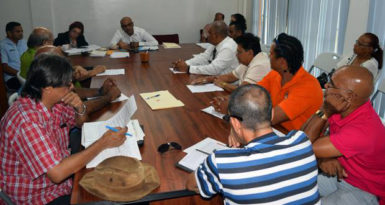Although committed to resubmitting a list of nominees for Chairperson of the Guyana Elections Commission (Gecom), Opposition Leader Bharrat Jagdeo has voiced concern that President David Granger’s criteria for candidates may not be legal or constitutional.
“In fact, these criteria were seen as an imposition on the constitution which makes no such demands. More disconcerting to all was one clause in particular “(d) that a person will not be an activist in any form (gender, racial, religious, etc.,);” which was thought to be discriminatory and violated the anti-discrimination articles of the constitution,” a press release issued by Jagdeo’s office said yesterday, after consultations with civil society organizations for nominees.
Granger had written to Jagdeo last week, indicating his criteria for nominees eligible to be appointed as the Chairperson of Gecom in light of his rejection of Jagdeo’s initial list in December as unacceptable.

According to a statement on the “Qualities of the Chairman of the Guyana Elections Commission” that was sent by Granger, and which was released yesterday by Jagdeo, the candidate should be a person who is qualified to be a High Court Judge and should have been an attorney for a minimum of seven years. It said that in the absence of candidates who do not meet these qualifications, “any other fit and proper person” should be appointed. In this regard, the statement specifies that such persons should have the following characteristics:
“a) That person is deemed to have wide electoral knowledge, capable of handling electoral matters because he or she is qualified to exercise unlimited jurisdiction in civil matters;
- b) That person will discharge his or her functions without fear or favour, that is he or she will not allow any person or organization to influence him or her to compromise his or her neutrality;
- c) That person will discharge his or her functions neutrally, between the two opposing parties as he or she would have done in Court between two opposing litigants;
- d) That person will not be an activist in any form (gender, racial, religious etc);
- e) That person should not have any political affiliation or should not belong to any political party in any form, apparent or hidden; and,
- f) That person should have a general character of honesty, integrity, faithfulness and diligence in the discharge of his or her duty as Chairman.”
Granger wrote Jagdeo after the latter’s request for clarifications during a recent meeting at State House.
The first list submitted by Jagdeo did not include a judge; rather, it comprised candidates that he felt could qualify under the “fit and proper” proviso.
Article 161 (2) of the constitution states, “Subject to the provisions of paragraph (4), the Chairman of the Elections Commission shall be a person who holds or who has held office as a judge of a court having unlimited jurisdiction in civil and criminal matters in some part of the Commonwealth or a court having jurisdiction in appeals from any such court or who is qualified to be appointed as any such judge, or any other fit and proper person, to be appointed by the President from a list of six persons, not unacceptable to the President, submitted by the Leader of the Opposition after meaningful consultation with the non-governmental political parties represented in the National Assembly.”
The release from Jagdeo’s office said that after receiving the clarifications, the representatives of 33 civil society organizations felt that finding a person possessing all the characteristics and qualities set out in Granger’s statement might be difficult.
The release said Jagdeo met with 55 representatives of 33 civil society organizations, which included leaders of the Christian, Hindu and Muslim faiths, the private sector, GTUC and FITUG, Amerindian organizations and the National Toshaos Council, the Indian Arrival Committee and the Justice Institute.
It added that Granger’s letter was shared with them and that Jagdeo asked that they discuss the contents with their members and submit names, if any, for his consideration by Monday, March 27, 2017.
“However, the participants found it difficult to come up with candidates who would fulfill all of these criteria. In fact, persons doubted if the President himself could find anyone who fulfilled his own criteria. Some wondered what the reasons were for the President making the range for selection so extraordinarily restrictive. In fact, these criteria were seen as an imposition on the constitution which makes no such demands,” it said.
According to the release, Jagdeo had grave reservations about the legality and constitutionality of these criteria and intends to have them brought to the attention of the president. However, it added that he remained committed to submitting six more names as requested by the president, since the nomination is an urgent and critical issue for the entire nation and its stability.




